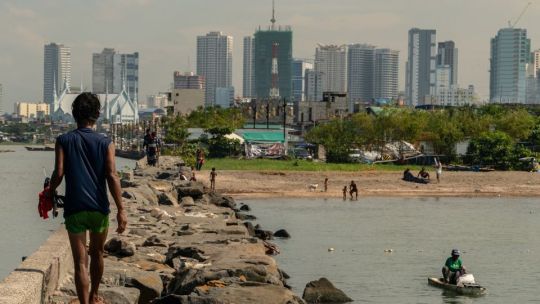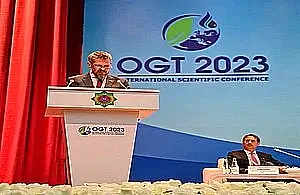#greenhousegasemissions
Text
Calculating the amount companies owe for causing global warming
Fossil fuel companies ignore damages caused by the climate disaster they created. Leaving governments, insurance companies, and private citizens to cover the costs of mitigation, damage and reconstruction.
In the meantime, these fossil fuel corporations are price-gouging and ripping off the world as they brag about record-breaking profits (while receiving government subsidies - aka corporate welfare)
Fossil fuel corporations must be held accountable and should be legally obligated to help pay for the crisis they created.
Researchers calculated the amount each fossil fuel corporation could pay to a global fund for mitigation efforts, climate damage and climate refugee relocation.
Top 5 Fossil Fuel Corporations Annual Assessments:
Saudi Aramco - $42.7 billion
Gazprom - $20.1 billion
Exxon-Mobil - $18.4 billion
Shell - $16.3 billion
Chevron - $12.8 billion
#FossilFuels#ClimateDisasters#CorporateLiability#CorporateWelfare#GreenhouseGasEmissions#DisasterRelief
13 notes
·
View notes
Link
The idyllic beaches, vibrant culture, and delicious cuisine of Thailand have long attracted travelers worldwide. However, the tourism industry also faces a critical challenge: minimizing its environmental impact. In response, the Tourism Authority of Thailand (TAT) has launched the innovative CF-Hotels initiative, empowering hotels and tourists to work together towards a more sustainable future for Thailand's tourism sector. This comprehensive article explores the CF-Hotels initiative, its functionalities, and its potential contribution to sustainable tourism practices in Thailand. CF-Hotels Initiative Promotes Sustainable Hospitality Understanding the CF-Hotels Initiative: A Data-Driven Approach to Sustainability The CF-Hotels initiative revolves around a dedicated online platform: https://www.hotels.com/. This platform serves as a central hub for hotels and tourists alike, fostering transparency and accountability in environmental practices within the Thai hospitality industry. Here's a closer look at the platform's functionalities: Environmental Inventory Management: Hotels participating in the CF-Hotels initiative gain access to a user-friendly system for recording their environmental performance data. This data encompasses key areas like energy consumption, water usage, waste generation, and greenhouse gas emissions. Carbon Footprint Calculation: The platform leverages the collected data to calculate each participating hotel's carbon footprint. This provides valuable insights into the environmental impact of the hotel's operations. Data Analytics for Improvement: Beyond mere data collection, the CF-Hotels platform offers robust analytics tools. Hotels can utilize these tools to identify areas for improvement in their sustainability practices. This data-driven approach empowers hotels to make informed decisions that minimize their environmental footprint. STAR Certification and Recognition: Hotels can leverage the environmental data collected through the CF-Hotels platform as part of their submissions for the prestigious STAR (Sustainable Tourism Acceleration Rating) certification. This certification recognizes hotels that demonstrate a commitment to sustainable practices. Additionally, hotels actively involved in the CF-Hotels initiative may be eligible for recognition at the Thailand Tourism Awards. By providing a centralized platform for data collection, analysis, and transparency, the CF-Hotels initiative empowers hotels to actively manage their environmental impact and pursue sustainable practices. The Power of Choice: How Tourists Can Contribute to Sustainable Tourism While the CF-Hotels initiative empowers hotels to track and improve their sustainability performance, tourists also play a crucial role in promoting responsible travel: Supporting Sustainable Hotels: Travelers seeking to contribute to Thailand's sustainable tourism goals can actively choose to stay at hotels participating in the CF-Hotels initiative. This sends a clear message to the hospitality industry that eco-conscious practices are valued by tourists. Making Informed Decisions: The CF-Hotels platform fosters transparency by allowing tourists to access information about the environmental performance of participating hotels. This empowers them to make informed travel decisions that align with their values regarding sustainability. By consciously supporting hotels committed to environmental responsibility, tourists can become active participants in Thailand's sustainable tourism journey. Collaboration for a Sustainable Future: CF-Hotels and Beyond The CF-Hotels initiative is a testament to TAT's commitment to promoting sustainable tourism practices within Thailand. This initiative goes beyond just a platform; it fosters collaboration between key stakeholders: TAT: Provides leadership and guidance for the development and implementation of the CF-Hotels initiative. Research Unit for Energy Economic and Ecological Management, Science and Technology Research Institute, Chiang Mai University: Offers technical expertise and research support for the initiative. Thailand Greenhouse Gas Management Organisation: Ensures the project adheres to national sustainability guidelines. Hotels: Play an active role by collecting necessary data and implementing sustainable practices within their operations. Tourists: Contribute by choosing hotels committed to environmental responsibility. This collaborative approach creates a comprehensive framework for promoting sustainable tourism across Thailand. The CF-Hotels initiative serves as a stepping stone towards a more sustainable future for Thailand's tourism industry. By empowering hotels and tourists to make informed decisions, the initiative paves the way for a future where tourism thrives alongside environmental responsibility.
#CFHotelsInitiative#CFHotelsInitiativePromotesSustainableHospitality#EnvironmentalFootprint#greenhousegasemissions#STARCertification#sustainabletourism#ThailandTourismAuthorityTAT#ThailandTourismAwards
0 notes
Text
Urgent Action Needed: COP28 Summit Calls for Clean Energy to Fight Climate Change
#climatechange #COP28climatesummit #fossilfuels #greenhousegasemissions #renewableenergysources
#Politics#climatechange#COP28climatesummit#fossilfuels#greenhousegasemissions#renewableenergysources
0 notes
Text
Canada Sets Emissions Cap for Oil and Gas to Fight Climate Change
#canada #climatechange #emissionscap #greenhousegasemissions #oilandgasindustry
0 notes
Text
Heat is On! Can India adapt to warming weather?
In conversation with India Energy Hour, Aditya Valiathan Pillai from the Centre for Policy Research, says Heat Action Plans are a good start but they need to be effectively implemented.
The India Energy Hour
Heatwaves in India have become more frequent, intense, and longer-lasting. This increase can be attributed to the larger problem of global warming and climate change. Rising greenhouse gas emissions have led to a rise in average global temperatures, which directly contribute to the occurrence and severity of heat waves. In order to understand the importance of Heat Action Plans and the implications of extreme weather, we spoke to Aditya Valiathan Pillai, a fellow with the Initiative for Climate, Energy and Environment (ICEE) at the Centre for Policy Research (CPR). His current work focuses on strengthening policies to combat extreme heat.
Tune in to the full episode to find out more!
Available on major podcast platforms and our website

0 notes
Text
Global Initiative: Enhancing Childhood Cancer Survival

Childhood Cancer Medicines Still Inaccessible in Low-Income Countries
During his weekly press briefing in Geneva, Tedros Adhanom Ghebreyesus, the Director-General of the UN World Health Organization (WHO), revealed that only a quarter of low-income countries currently provide coverage for childhood cancer medicines through public benefits.
This lack of accessibility has dire consequences for children and families, subjecting them to significant suffering, financial hardship, or worse, putting them at risk of receiving substandard and falsified medications.
Consequently, the survival rate for children battling cancer in these countries is distressingly low, standing at less than 30 percent. This is in stark contrast to the impressive 90 percent survival rate for children in high-income countries.
WHO's Global Initiative for Childhood Cancer
To tackle this pressing issue, the WHO, in partnership with the St. Jude Children's Research Hospital based in the United States, a renowned non-profit pediatric treatment and research facility specializing in leukemia and other cancers, launched the Global Initiative for Childhood Cancer back in 2018.
The overarching goal of this initiative is to achieve a minimum 60 percent survival rate for childhood cancer patients in low and middle-income countries by the year 2030.
Specifically focusing on addressing six highly curable types of cancer, which collectively represent more than half of all childhood cancer cases, this initiative strives to make a significant impact on improving survival rates worldwide.
Access to Quality-Assured Medicines at No Cost
In December 2021, the WHO and St. Jude jointly initiated a global program with the aim of improving access to childhood cancer medicines.
Mr. Tedros emphasized that the primary objective of this program is to provide universal and sustained access to quality-assured essential cancer medicine for children in developing economies, free of charge.
This vital effort aims to relieve the burden of exorbitant medical expenses on vulnerable families and ensure that every child has the best chance of survival and recovery.
WHO's New Essential Medicines List
Today, the WHO announced a significant update to the Essential Medicines List and the Essential Medicines List for Children. Among the new additions are crucial cancer medicines, alongside treatments for multiple sclerosis, infectious diseases, and cardiovascular conditions, among others.
These additions are expected to have a profound public health impact worldwide without jeopardizing the health budgets of low and middle-income countries.
Alarming Heat-Related Deaths in Europe
Amid the ongoing heatwave across the northern hemisphere, the WHO has reported distressing news about Europe. An estimated 61,000 people lost their lives due to heat-related causes last month, highlighting the severity of heat stress on human health and well-being.
Heat Stress and its Health Implications
Heat stress refers to the body's inability to cool itself efficiently, leading to exhaustion or heat stroke. The WHO has linked heat stress to the exacerbation of various health conditions, including cardiovascular, respiratory, and kidney diseases, as well as mental health problems.
Vulnerable Populations at Risk
Director-General Tedros Adhanom Ghebreyesus expressed deep concern about the impact of extreme weather conditions on the health of vulnerable populations.
He particularly highlighted those living in conflict-affected areas or displaced communities, where access to safe water, sanitation, cooling facilities, and medical supplies is limited or non-existent.
Urgent Need for Precautionary Measures
In response to this pressing issue, Mr. Tedros called on governments to establish early-warning and response systems, develop strategies tailored for both the general population and vulnerable groups, and create effective communication plans.
Additionally, he underscored the urgency of reducing greenhouse gas emissions to protect the planet and safeguard all forms of life. By doing so, the international community can take proactive steps toward mitigating the devastating impacts of extreme heat and ensuring the well-being of people worldwide.
Sources: THX News & United Nations.
Read the full article
#AccesstoMedicines#CancerSurvivalRate#ChildhoodCancerMedicines#EssentialMedicinesList#ExtremeWeatherImpact#GreenhouseGasEmissions#Heat-RelatedDeaths#low-incomecountries#VulnerablePopulations#WHOGlobalInitiative
0 notes
Text
The Impact of Climate Change on Global Seafood Market

Climate change is one of the biggest threats facing our planet, and it has already had a significant impact on the global seafood market. The world's oceans are experiencing rising temperatures, increasing acidity, and changing currents, which are all affecting the ecosystems that support marine life. In this article, we will explore the impact of climate change on the global seafood market, including its effects on fisheries, aquaculture, and seafood production.
Effects on Fisheries
Climate change is having a significant impact on global fisheries, which are facing challenges such as shifting fish populations, changing migration patterns, and changing ocean currents. This has made it difficult for fishermen to find fish, and in many cases, it has led to overfishing and the depletion of fish stocks. This has had a significant impact on the seafood market, with some species becoming harder to find and more expensive to purchase.
Effects on Aquaculture
Aquaculture, which is the farming of fish and other aquatic species, is also being impacted by climate change. Rising water temperatures are causing stress and disease in farmed fish, which can lead to lower yields and higher mortality rates. Changing ocean chemistry is also affecting shellfish production, as it makes it harder for shellfish to build and maintain their shells. This has had a significant impact on the availability and cost of farmed seafood products.
Effects on Seafood Production
Climate change is also having a significant impact on seafood production, which includes processing, packaging, and transportation. Rising temperatures are making it more difficult to preserve and transport fresh seafood products, which has led to a shorter shelf life and higher waste. Changes in ocean currents are also affecting shipping routes and making it more difficult to transport seafood products to market.
Mitigating the Impact of Climate Change on the Global Seafood Market
To mitigate the impact of climate change on the global seafood market, it is important to take steps to reduce greenhouse gas emissions and promote sustainable fishing practices. This includes reducing our reliance on fossil fuels, investing in renewable energy sources, and promoting sustainable fishing practices such as selective fishing, reducing bycatch, and protecting critical fish habitats.
It is also important to support local and regional seafood markets that promote sustainable fishing practices and source seafood products from responsible fisheries. These markets can help to support local fishing communities, promote sustainable seafood production, and provide consumers with access to fresh and healthy seafood products.
Conclusion
Climate change is having a significant impact on the global seafood market, affecting fisheries, aquaculture, and seafood production. To mitigate these effects, it is important to take steps to reduce greenhouse gas emissions, promote sustainable fishing practices, and support local and regional seafood markets that promote responsible seafood production. By taking these steps, we can help to protect the world's oceans and ensure the long-term sustainability of the seafood industry.
#ClimateChangeImpact#SeafoodMarket#FisheriesChallenge#AquacultureIssues#SustainableFishingPractices#OverfishingConsequences#SeafoodProductionChallenge#GreenhouseGasEmissions#RenewableEnergySolution#LocalSeafoodMarkets.
0 notes
Photo

Private jet pollution in Europe has skyrocketed 855% since the pandemic
Private jet flights and emissions have soared in Europe since the pandemic.Read more...
https://qz.com/private-jet-emissions-flight-europe-climate-pandemic-1850283244
#greenhousegasemissions#environment#climatechangepolicy#cannes#globalwarming#carbonfinance#climatechange#environmentalimpactofaviation#greenpeace#climatechangeinaustralia#emissionstrading#Julia Malleck#Quartz
0 notes
Link
DFDS, a leading European shipping and logistics company, has announced a significant step towards achieving its ambitious sustainability goals. The company placed an order for an additional 100 electric trucks, bringing its total electric truck fleet to a staggering 225. This move underscores DFDS's commitment to decarbonizing its operations and playing a leading role in the transition to sustainable transportation in Europe. DFDS Ramps Up Electric Truck Fleet to Meet Growing Demand The newly ordered electric trucks will be strategically deployed across existing markets in Europe where DFDS already utilizes electric vehicles. Additionally, the company plans to expand its electric truck operations into new territories like the UK, Ireland, and Norway. This expansion reflects the growing demand for environmentally friendly transport solutions across the continent. With this substantial order, DFDS solidifies its position as a frontrunner in the electrification of the European heavy-duty transport sector. Niklas Anderson, EVP of the Logistics Division at DFDS, emphasizes the company's dedication to sustainability leadership: "We want to be a driving force in the shift towards more sustainable road transport. Our expanding electric truck fleet goes beyond simply reducing our carbon footprint. It empowers DFDS to support an increasing number of businesses seeking to decarbonize their supply chains. These additional 100 electric trucks are a powerful testament to our commitment to spearheading this crucial development." Strengthening Partnership with Volvo Trucks for Sustainable Solutions The new electric trucks will be sourced from Volvo Trucks, a leading manufacturer of heavy-duty electric vehicles. This order reinforces the strong partnership between DFDS and Volvo Trucks, both committed to accelerating the transition to zero-emission transportation. Commenting on the collaboration, Roger Alm, President of Volvo Trucks, expressed his pride: "We are incredibly honored to continue our close partnership with DFDS. This significant order for an additional 100 Volvo electric trucks signifies their unwavering trust in our company. The substantial growth of DFDS's electric truck fleet demonstrates that zero-emissions transport is a viable solution readily available today." DFDS Paves the Way for a Greener Future This move by DFDS aligns perfectly with their ambitious decarbonization plan, which aims for net-zero emissions by 2050. The company has already set a crucial milestone of electrifying at least 25% of its truck fleet by 2030. With the addition of the new trucks, DFDS currently boasts the largest fleet of heavy-duty electric trucks in Europe. As of the end of 2023, DFDS's existing fleet of 95 electric trucks operating in Sweden, Denmark, Lithuania, Belgium, and the Netherlands has demonstrably reduced greenhouse gas emissions by a significant 1,516 tonnes (Well-to-Wheel). This quantifiable impact highlights the tangible environmental benefits of electric vehicle adoption. Furthermore, DFDS has taken additional steps towards sustainable transportation by deploying 52 electric reefer trailers in Denmark. These specialized trailers offer near zero-emission transport for temperature-controlled cargo like frozen and refrigerated goods. The company's initial order for 100 electric trucks in October 2021, followed by an additional 25 trucks two months later, demonstrates its unwavering commitment to accelerating the electrification of its fleet. Conclusion: A Sustainable Future for European Transportation DFDS's substantial investment in electric trucks represents a significant milestone in the European transportation sector's journey towards a sustainable future. By actively pursuing electrification and forging strategic partnerships with leading manufacturers like Volvo Trucks, DFDS is setting a powerful example for other companies and contributing meaningfully to reducing greenhouse gas emissions. This move positions DFDS as a leader in the greening of European transportation, paving the way for a cleaner and more environmentally responsible future. FAQs: Q: How many electric trucks will DFDS add to its fleet with this latest acquisition? A: DFDS plans to add 100 additional electric trucks to its fleet, bringing the total number of electric vehicles to 225. Q: What are the benefits of transitioning to electric trucks for DFDS? A: Transitioning to electric trucks allows DFDS to significantly reduce its carbon footprint, support sustainable transport solutions, and meet the growing demand for low-emission transportation. Q: What types of electric trucks will DFDS be adding to its fleet? A: The new electric trucks will be Volvo FH Electric and Volvo FM Electric models, reflecting DFDS's commitment to quality and innovation in sustainable transportation. Q: Why is DFDS investing heavily in electric trucks? A: DFDS is committed to reducing its environmental impact and achieving net-zero emissions by 2050. Electric trucks offer a significant reduction in greenhouse gas emissions compared to traditional diesel-powered trucks. Q: What are the benefits of electric trucks for businesses like DFDS? A: Electric trucks offer environmental benefits by reducing emissions, but they can also lead to operational cost savings on fuel and maintenance. Additionally, electric trucks can help businesses meet their own sustainability goals.
#decarbonization#DFDS#DFDSAcceleratesGreenTransformation#electrictrucks#electricvehicles#environmentalimpact#Europeanmarkets.#greenhousegasemissions#heavydutytransport#netzeroemissions#sustainability#VolvoTrucks
0 notes
Text
Huntington Beach's Stand: Local Control vs State Authority in California's Social Justice Battle
#abortionservices #affordablehousing #California #Californiapoliticallandscape #conservativevalues #diversityandinclusion #equityandinclusivity #governmentroleinpromotingsocialjustice #greenhousegasemissions #HuntingtonBeach #liberalvalues #localcontrol #localcontrolversusstateauthority #lowerincomefamilies #marginalizedcommunities #peopleofcolor #socialjusticeissues #stateintervention #statemandates #TonyStrickland #wealthierresidents #wokepolicies
#Politics#abortionservices#affordablehousing#California#Californiapoliticallandscape#conservativevalues#diversityandinclusion#equityandinclusivity#governmentroleinpromotingsocialjustice#greenhousegasemissions#HuntingtonBeach#liberalvalues#localcontrol#localcontrolversusstateauthority#lowerincomefamilies#marginalizedcommunities#peopleofcolor#socialjusticeissues#stateintervention#statemandates#TonyStrickland#wealthierresidents#wokepolicies
0 notes
Text
Walmart Goes Green with Electric Delivery Vans: A Big Step Towards Cleaner Air!
#electricdeliveryvans #electricvehicles #greenhousegasemissions #sustainableenergysolutions #Walmart
#Business#electricdeliveryvans#electricvehicles#greenhousegasemissions#sustainableenergysolutions#Walmart
0 notes
Text
The way we eat has a profound impact on the health of our planet. Our food choices determine the demand for certain agricultural practices, which in turn affects land use, water usage, and greenhouse gas emissions. With the growing concern for the environment, many people are turning to plant-based diets as a way to reduce their carbon footprint and make a positive impact.
In this blog, we'll explore the sustainability and environmental impact of plant-based diets. We'll look at the ways in which a shift towards plant-based eating can help conserve natural resources, reduce greenhouse gas emissions, and preserve biodiversity.
#PlantBasedDiets#Sustainability#EnvironmentalImpact#ReducingCarbonFootprint#ConservingNaturalResources#GreenhouseGasEmissions#Biodiversity#HealthyEating#ClimateChange#EcoFriendlyLiving
0 notes
Text

"Underwater by 2100? The Looming Threat of Rising Sea Levels in Asia"
Climate change and rising sea levels are posing a severe threat to cities in Asia. According to recent reports, rising sea levels could affect more than a hundred million people living in coastal areas in Asia by 2050. The impact of this phenomenon could be catastrophic, with entire cities being submerged, and people losing their homes and livelihoods.
The issue of rising sea levels is not limited to Asia, but it's a global problem that requires immediate attention. Governments, policymakers, and citizens need to take action to mitigate the effects of climate change and reduce greenhouse gas emissions. This includes investing in renewable energy, reducing carbon footprints, promoting sustainable practices, and raising awareness about the issue.
Moreover, the impact of rising sea levels could extend beyond environmental and humanitarian concerns, to economic and political implications. Coastal cities are vital economic hubs, and their disruption due to rising sea levels could lead to economic instability and political tensions.
In conclusion, the issue of rising sea levels is a significant challenge that requires a collective effort from all stakeholders. We need to take action to reduce the impact of climate change and protect our planet's future. By being informed, raising awareness, and taking concrete steps towards a sustainable future, we can make a positive change.
Keywords: climate change, rising sea levels, Asia, coastal cities, environmental impact, humanitarian crisis, greenhouse gas emissions, renewable energy, carbon footprints, sustainable practices, economic implications, political tensions, stakeholders, informed, awareness, sustainable future.
@BloggingBandit1
#ClimateChange#RisingSeaLevels#Asia#CoastalCities#EnvironmentalImpact#HumanitarianCrisis#GreenhouseGasEmissions#RenewableEnergy#CarbonFootprints#SustainablePractices#EconomicImplications#PoliticalTensions#Stakeholders#Informed#Awareness#SustainableFuture
1 note
·
View note
Text
UK Highlights Climate Progress and Commitment to Methane Reduction at International Energy Conference

UK's Decarbonization Efforts and Net Zero Commitments

Chargé d’Affaires Mr John Hamilton discussed Environmental Issues of the Development of Hydrocarbon Fields at the International Conference in Ashgabat. Photo by UK.GOV.
UK leads G7 in emissions reduction
In a noteworthy speech at the "International scientific conference on energy perspectives, new technologies and environmental aspects in the development of hydrocarbon resources" held in Turkmenistan, John Hamilton, the UK Chargé d'Affaires, emphasized the United Kingdom's dedication to combating climate change and reducing emissions.
Acknowledging the esteemed audience of experts, Hamilton discussed the UK's significant progress in decarbonizing its economy and the country's pioneering commitment to achieving net zero greenhouse gas emissions by 2050.
UK's Impressive Emissions Reduction Record
Cutting emissions while growing the economy
Under the Climate Change Act of 2008 and the Environment Act of 2021, the UK has established a strong legal framework to reach its ambitious emissions reduction goals.
The UK has outperformed other G7 countries by cutting emissions by 48% between 1990 and 2021, even as its economy grew by 65%.
This remarkable achievement has been made possible through proactive measures such as upgrading the gas network, implementing flare gas recovery systems, and improving flare and venting management practices.
UK's Commitment to Supporting Developing Nations
Doubling International Climate Finance
Recognizing the importance of assisting developing countries in their transition to sustainable energy sources, the UK has pledged to double its International Climate Finance to £11.6 billion between 2021 and 2025.
This financial support will be directed towards promoting energy efficiency and renewable energy deployment in developing nations.
Over the past decade, UK International Climate Finance has already benefited millions of people affected by climate change, providing improved access to clean energy and reducing greenhouse gas emissions.
UK's Leadership in Global Climate Initiatives
COP26 and the Glasgow Climate Pact
The UK has demonstrated its leadership and credibility in the global fight against climate change during its presidency at the recent COP26 conference in Glasgow.
The conference saw all 197 participating countries reach a consensus on the need for urgent climate action, resulting in the Glasgow Climate Pact.
A notable outcome of the conference was the launch of the Global Methane Pledge, which now boasts 150 participants committed to reducing global methane emissions by at least 30% from 2020 levels by 2030.
UK-Turkmenistan Cooperation and Future Opportunities
Supporting Turkmenistan's Climate Efforts
Hamilton commended Turkmenistan's participation at COP26 and expressed enthusiasm for the country's plans to address methane pollution.
He welcomed the recent announcement of a methane study roadmap and offered the UK's support in its implementation.
Additionally, the UK Embassy is collaborating with the United Nations Development Programme (UNDP) and the Turkmenistan government to update Turkmenistan's Greenhouse Gas Inventory, enabling better understanding and targeted mitigation efforts.
Promoting Sustainable Business Ventures
The UK Embassy in Turkmenistan is actively promoting sustainable business opportunities and anticipates the arrival of UK companies later this year, bringing their expertise and experience to the country.
One such company, Aggreko, a global leader in modular solutions for monetizing methane emissions, stands ready to support Turkmenistan by offering portable equipment for rent to facilitate the utilization of associated petroleum gas (APG).
The UK Export Finance is also ready to provide favorable financing of up to £1.75 billion ($2.1 billion) to support investments in Turkmenistan, as it has done for clean energy projects worldwide.
UK's Focus on Renewable Energy and Global Collaboration
Investing in Clean Power
The UK recognizes the significant returns on investments in renewable energy, which have outperformed fossil fuels by 367% since 2010. Notably, solar photovoltaic (PV) alone creates twice as many jobs as fossil fuels.
To accelerate the global transition to clean power, the UK has established the Energy Transition Council (ETC), bringing together over 20 governments and more than 15 international institutions.
The ETC provides technical assistance and financial support through its Rapid Response Facility to help developing countries adopt clean power solutions.
Human Impact of Methane Reduction
Saving Lives and Protecting Agriculture
While acknowledging the cost-effectiveness of tackling methane emissions, Hamilton concluded his speech by emphasizing the human impact of such efforts.
Quoting the Global Methane Assessment, he highlighted that achieving the 2030 methane reduction goal can prevent over 200,000 premature deaths, numerous asthma-related emergency room visits, and millions of tons of crop losses caused by ground-level ozone pollution.
In his closing remarks, Hamilton urged the audience to collectively work towards the necessary changes, ensuring a sustainable and prosperous future for all.
Sources: THX News & British Embassy Ashgabat.
Read the full article
#DecarbonizationEfforts#EnergyTransitionCouncil#GlobalClimateInitiatives#GreenhouseGasEmissions#InternationalClimateFinance#MethaneReduction#NetZeroEmissions#RenewableEnergyInvestments#SustainableBusinessOpportunities#UKClimateAction
0 notes
Text
Google accused of airbrushing carbon emissions in flight search results
http://dlvr.it/SXDSbl
0 notes
Text

6 Automakers and 30 Countries Say They’ll Phase Out Gasoline Car Sales - The New York Times http://dlvr.it/SVbmqX
0 notes